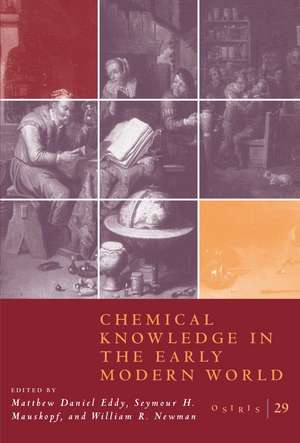Osiris, Volume 29: Chemical Knowledge in the Early Modern World: Osiris, cartea 29
Editat de Matthew D. Eddy, Seymour H. Mauskopf, William R. Newmanen Limba Engleză Paperback – 18 mai 2015
The last twenty-five years have witnessed some provocative transmutations in our understanding of early modern chemistry. The alchemist, once marginalized as a quack, now joins the apothecary, miner, humanist, and natural historian as a practitioner of “chymistry.” In a similar vein, the Chemical Revolution of the eighteenth century, with its focus on phlogiston and airs, has been expanded to include artisanal, medical, and industrial practices. This collection of essays builds on these reappraisals and excavates the affinities between alchemy, chymistry, and chemistry from the sixteenth to the eighteenth centuries. It reveals a rich world of theory and practice in which instruments, institutions, inscriptions and ideas were used to make material knowledge. More generally, the volume will catalyze wide-ranging discussions of material and visual cultures, the role of expertise, and the religious and practical contexts of scientific inquiry.
Preț: 164.19 lei
Preț vechi: 194.33 lei
-16% Nou
Puncte Express: 246
Preț estimativ în valută:
31.42€ • 32.89$ • 26.15£
31.42€ • 32.89$ • 26.15£
Carte indisponibilă temporar
Doresc să fiu notificat când acest titlu va fi disponibil:
Se trimite...
Preluare comenzi: 021 569.72.76
Specificații
ISBN-13: 9780226158396
ISBN-10: 022615839X
Pagini: 450
Dimensiuni: 178 x 254 x 15 mm
Greutate: 0.56 kg
Editura: University of Chicago Press Journals
Colecția University of Chicago Press Journals
Seria Osiris
ISBN-10: 022615839X
Pagini: 450
Dimensiuni: 178 x 254 x 15 mm
Greutate: 0.56 kg
Editura: University of Chicago Press Journals
Colecția University of Chicago Press Journals
Seria Osiris
Notă biografică
Matthew D. Eddy is Senior Lecturer in the history of science and culture at Durham University. Seymour H. Mauskopf of Professor Emeritus of History at Duke University. His fields of research interest are the history of chemistry and the history of marginal science. William R. Newman is the Distinguished Professor and Ruth N. Halls Professor in the Department of History and Philosophy of Science at Indiana University. He is also General Editor, The Chymistry of Isaac Newton Project.
Cuprins
INTRODUCTION
An Introduction to Chemical Knowledge in the Early Modern World
Matthew Daniel Eddy,Seymour H. Mauskopf, and William R. Newman
THE AGE OF CHYMISTRY (1450–1700)
Transmuting Sericon: Alchemy as “Practical Exegesis” in Early Modern England
Jennifer M. Rampling
Auß Quecksilber und Schwefel Rein: Johann Mathesius (1504–65) and Sulfur-Mercurius in the Silver Mines of Joachimstal
John A. Norris
Eloquence in the Marketplace: Erudition and Pragmatic Humanism in the Restoration of Chymia
Bruce T. Moran
Robert Boyle, Transmutation, and the History of Chemistry before Lavoisier: A Response to Kuhn
William R. Newman
TRANSITIONS FROM CHYMISTRY TO CHEMISTRY (1675–1750)
The Chymistry of “The Learned Dr Plot” (1640–96)
Anna Marie Roos
The End of Alchemy?: The Repudiation and Persistence of Chrysopoeia at the Académie Royale des Sciences in the Eighteenth Century
Lawrence M. Principe
Etienne-François Geoffroy (1672–1731), a Chemist on the Frontiers
Bernard Joly
CHEMISTRY IN THE 18TH CENTURY
Communications of Chemical Knowledge: Georg Ernst Stahl and the Chemists at the French Academy of Sciences in the First Half of the Eighteenth Century
Ku-ming (Kevin) Chang
Measuring Fire: Herman Boerhaave and the Introduction of Thermometry into Chemistry
John C. Powers
How to See a Diagram: A Visual Anthropology of Chemical Affinity
Matthew Daniel Eddy
Between the Workshop and the Laboratory: Lavoisier’s Network of Instrument Makers
Marco Beretta
An Empire’s Extract: Chemical Manipulations of Cinchona Bark in the Eighteenth-Century Spanish Atlantic World
Matthew James Crawford
Elements in the Melting Pot: Merging Chemistry, Assaying, and Natural History, Ca. 1730–60
Hjalmar Fors
Pierre-Joseph Macquer: Chemistry in the French Enlightenment
Christine Lehman
Chemical Expertise: Chemistry in the Royal Prussian Porcelain Manufactory
Ursula Klein
Pharmacy and Chemistry in the Eighteenth Century: What Lessons for the History of Science?
Jonathan Simon
Concluding Remarks: A View of the Past through the Lens of the Present
Bernadette Bensaude-Vincent
Notes on Contributors
Index
An Introduction to Chemical Knowledge in the Early Modern World
Matthew Daniel Eddy,Seymour H. Mauskopf, and William R. Newman
THE AGE OF CHYMISTRY (1450–1700)
Transmuting Sericon: Alchemy as “Practical Exegesis” in Early Modern England
Jennifer M. Rampling
Auß Quecksilber und Schwefel Rein: Johann Mathesius (1504–65) and Sulfur-Mercurius in the Silver Mines of Joachimstal
John A. Norris
Eloquence in the Marketplace: Erudition and Pragmatic Humanism in the Restoration of Chymia
Bruce T. Moran
Robert Boyle, Transmutation, and the History of Chemistry before Lavoisier: A Response to Kuhn
William R. Newman
TRANSITIONS FROM CHYMISTRY TO CHEMISTRY (1675–1750)
The Chymistry of “The Learned Dr Plot” (1640–96)
Anna Marie Roos
The End of Alchemy?: The Repudiation and Persistence of Chrysopoeia at the Académie Royale des Sciences in the Eighteenth Century
Lawrence M. Principe
Etienne-François Geoffroy (1672–1731), a Chemist on the Frontiers
Bernard Joly
CHEMISTRY IN THE 18TH CENTURY
Communications of Chemical Knowledge: Georg Ernst Stahl and the Chemists at the French Academy of Sciences in the First Half of the Eighteenth Century
Ku-ming (Kevin) Chang
Measuring Fire: Herman Boerhaave and the Introduction of Thermometry into Chemistry
John C. Powers
How to See a Diagram: A Visual Anthropology of Chemical Affinity
Matthew Daniel Eddy
Between the Workshop and the Laboratory: Lavoisier’s Network of Instrument Makers
Marco Beretta
An Empire’s Extract: Chemical Manipulations of Cinchona Bark in the Eighteenth-Century Spanish Atlantic World
Matthew James Crawford
Elements in the Melting Pot: Merging Chemistry, Assaying, and Natural History, Ca. 1730–60
Hjalmar Fors
Pierre-Joseph Macquer: Chemistry in the French Enlightenment
Christine Lehman
Chemical Expertise: Chemistry in the Royal Prussian Porcelain Manufactory
Ursula Klein
Pharmacy and Chemistry in the Eighteenth Century: What Lessons for the History of Science?
Jonathan Simon
Concluding Remarks: A View of the Past through the Lens of the Present
Bernadette Bensaude-Vincent
Notes on Contributors
Index






